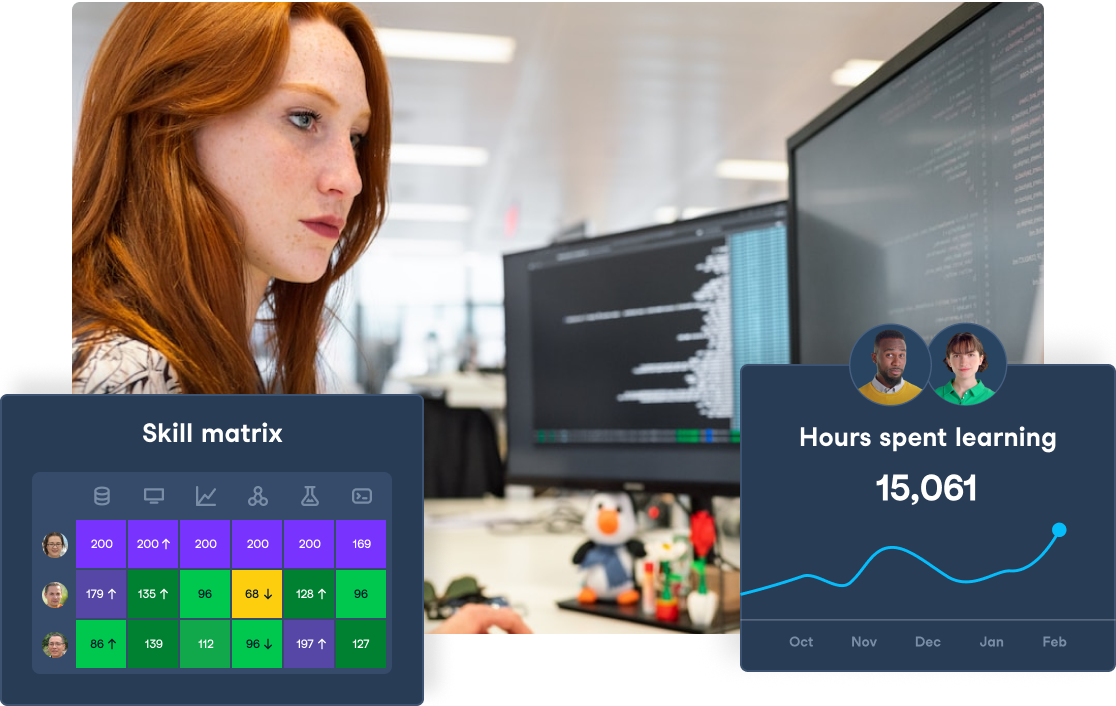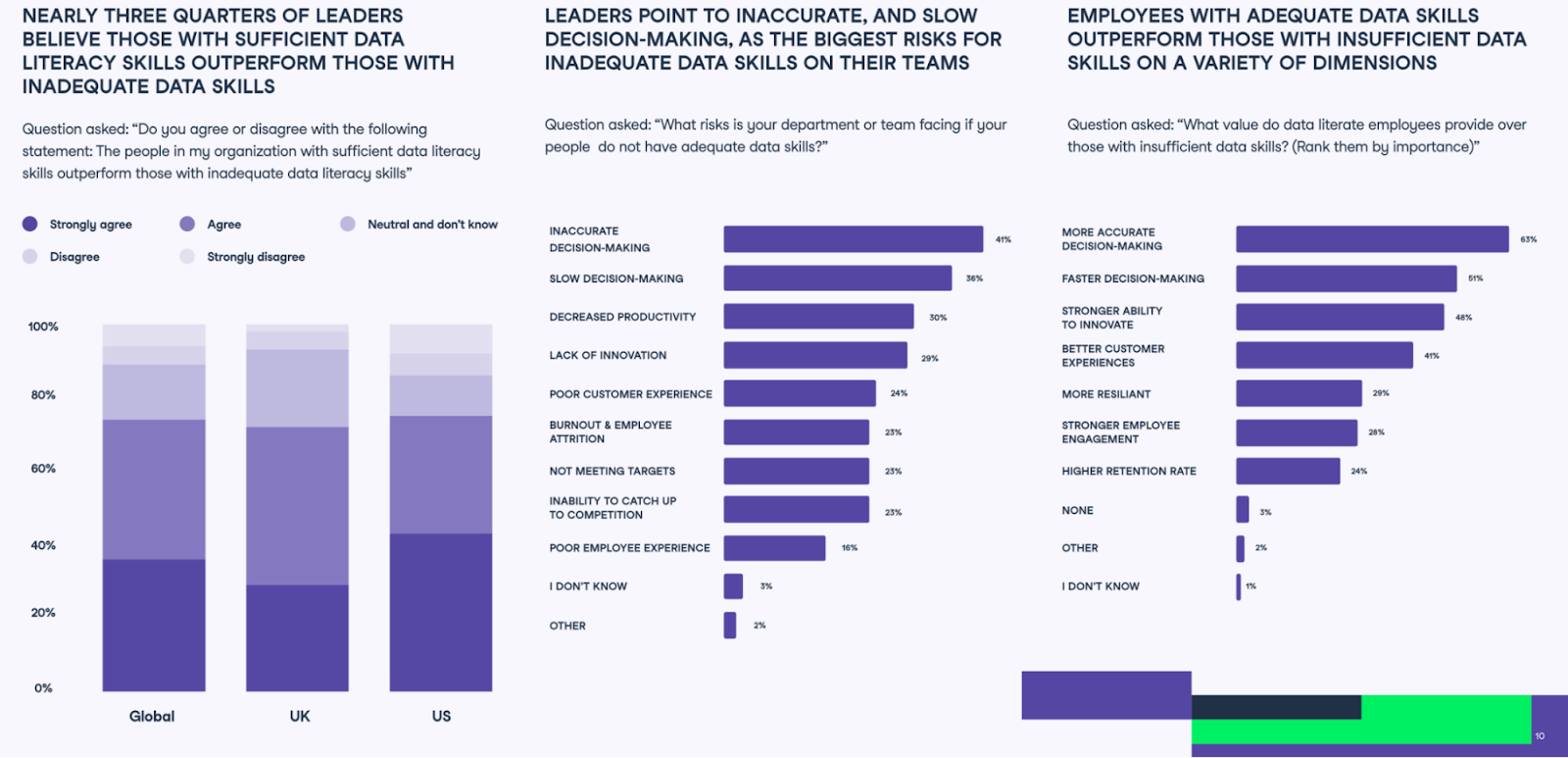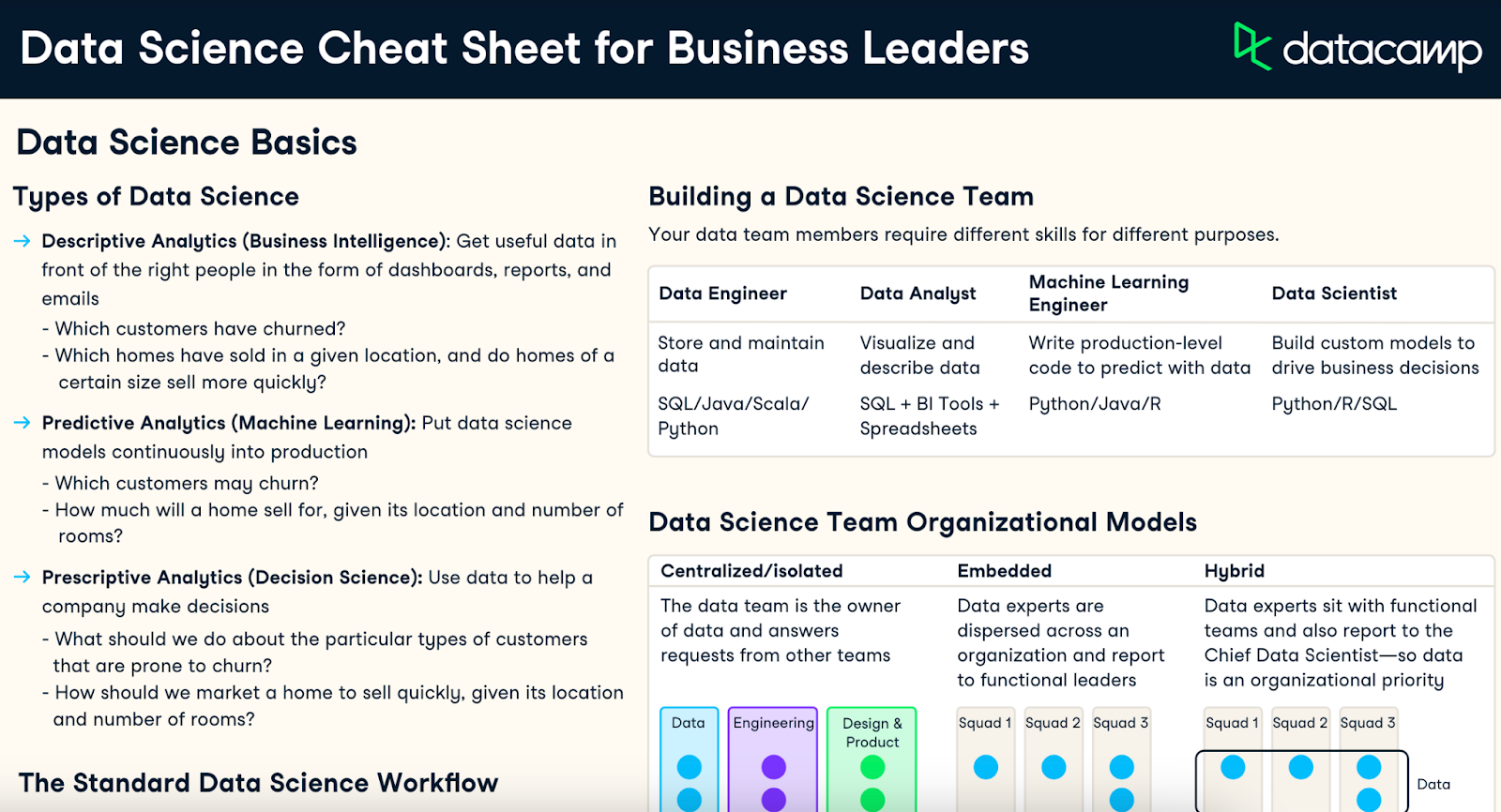Track
As we explored in the DataCamp Data Literacy Report, companies across industries are using an increasingly large amount of data to uncover valuable insights, optimize operations, and enhance customer experiences. As the demand for data-driven strategies continues to grow, organizations that can effectively hire and upskill individuals for strength in data analytics are positioning themselves well to take advantage of all of the valuable insights available in big data.
Here, we explore how organizations can build a successful data analytics training function.
Empower Your Team with Data Analysis Expertise
Enable data-driven decision-making with DataCamp for Business. Comprehensive courses, assignments, and performance tracking tailored for your team of 2 or more.

The Role of Data Analytics in Modern Business
Data-driven decision-making
Data-driven decision-making is a necessary approach to modern business that empowers organizations to make informed choices based on factual analysis rather than intuition alone.
By leveraging data analytics tools and techniques, businesses can sift through vast amounts of information to identify patterns, trends, and insights that drive strategic planning and execution. This analytical approach not only minimizes the risks associated with gut-based decisions but also fosters a culture of accountability and transparency within the organization.
When employees in an organization have the skills to mine insights from data and the organization has created a culture of data-driven decision-making, every part of the business can become more efficient, better for the customer, and the correct projects can be prioritized to drive the organization forward.
Enhancing customer experience
Data analytics plays a crucial role in enhancing customer experience by enabling companies to better understand customer behavior, preferences, and needs. Through analyzing customer data collected from various touchpoints, businesses can personalize marketing campaigns, tailor products or services, and optimize the overall customer journey.
By delivering personalized and relevant experiences, organizations can foster customer loyalty, increase satisfaction, and ultimately drive revenue growth in an increasingly competitive marketplace.
Intelligent data-centric organizations are constantly tracking customer behavior, running A/B tests, and optimizing the customer experience to ensure customers can have the best possible experience interacting with their organization. This leads to happier customers and more revenue for the organization.
Operational efficiency and risk management
Data analytics also serves as a powerful tool for improving operational efficiency and mitigating risks within organizations. By analyzing operational data, businesses can identify inefficiencies, streamline processes, and optimize resource allocation to achieve cost savings and enhance productivity.
Additionally, data analytics enables proactive risk management by identifying potential threats, vulnerabilities, and anomalies in real time, allowing companies to implement timely interventions and safeguards.
By integrating data analytics into their operations, organizations can create a more resilient and agile business environment capable of adapting to changing market conditions and regulatory requirements.
Risk management can also be improved by using data to help prioritize projects that are likely to succeed with a high return on investment rather than testing an uncertain project with limited upside.
Failed projects and poor prioritization pose significant financial and operational efficiency risks to organizations that can be mitigated with data-driven decision-making frameworks.
Why Invest in Data Analytics Training for Your Team?
According to data from Qlik, ‘large enterprises with strong corporate data literacy have shown up to 5% higher enterprise value.’ We saw the same in the Data Literacy Report. Nearly three-quarters (74%) of data leaders agreed or strongly agreed that those with data literacy skills outperformed those with inadequate data skills.

Let’s take a look in closer detail at some of the benefits of corporate data analytics training.
Bridging the skills gap
Investing in data analytics training for your team is crucial for bridging the data literacy skill gap and equipping your employees with the necessary expertise to leverage data effectively.
Technical proficiency and analytical capabilities are very important for all teams to extract meaningful information from complex datasets. By providing comprehensive training programs, organizations can empower their employees to develop these technical data skills, thereby enhancing their performance, job satisfaction, and overall contribution to the organization.
Fostering a culture of continuous learning
Data analytics training not only enhances technical skills but also generates a culture of continuous learning and professional development within the organization. By encouraging employees to expand their knowledge in data analytics skills, companies can create intellectual curiosity within the work environment.
This commitment to ongoing learning not only boosts employee engagement and retention but also enables organizations to adapt quickly to technological advancements and market changes.
Moreover, a culture that values continuous learning can significantly contribute to organizational growth and competitiveness in the long run, as employees will feel valued and feel that the organization is providing value to them.
Data analytics is also inherently a driver of a culture of continuous learning. The process of looking at a large dataset, cleaning it, understanding it, and putting the insights into an accessible and actionable deliverable is inherently a process of intellectual curiosity. As individuals practice their newly acquired data analytics skills, this will drive more desire for learning in all aspects of their work.
Achieving competitive advantages
Investing in data analytics training can provide organizations with a significant competitive advantage by enabling them to make data-driven decisions faster and more accurately than their competitors.
Employees who are well-versed in data analytics can analyze market trends, customer behavior, and operational metrics to uncover valuable insights that inform strategic planning and execution.
By leveraging these insights, companies can identify new opportunities, optimize business processes, and develop innovative products or services that resonate with their target audience. Ultimately, a skilled and data-literate workforce can help organizations operate in the most efficient and valuable way for their customers, leading to the best products or services, giving them a competitive advantage over less data-advanced competitors.
This advantage will lead to strong growth and success in any industry.
The Building Blocks of Successful Data Analytics Training
As we explore in our article on building a data academy, to implement data training, you must align learning outcomes with strategic business goals for transformative impact and high ROI. Similarly, you have to enhance learner engagement through diverse tactics and accessible content for all skill levels.
By utilizing various learning modalities like blended learning and communities of practice for effective skill application, you can improve the adoption of data skills. Another way of involving learners is to implement personalized paths to suit different data literacy needs. You can then continuously measure and optimize the academy's performance through assessments and engagement metrics to ensure it meets its educational objectives.
Customization to business needs
One of the fundamental building blocks of successful data analytics training is customization to business needs. Recognizing that each organization has unique objectives, challenges, and data landscapes, it is essential to tailor the training program to align with the specific requirements and goals of the business.
By incorporating industry-specific case studies, datasets, and scenarios into the curriculum, organizations can ensure that their employees gain practical knowledge and skills that are directly applicable to their roles and responsibilities.
This customized approach not only enhances the relevance and effectiveness of the training but also fosters greater engagement and buy-in from participants, ultimately maximizing the return on investment in data analytics education.

Our Data Science Cheat Sheet for Business Leaders can help leader master the basics.
Hands-on learning and real-world application
Another critical building block is the emphasis on hands-on learning and real-world application of data analytics concepts and techniques. Traditional lecture-based training methods are often insufficient for developing technical skills and fostering a deep understanding of data analytics principles.
By incorporating interactive workshops, simulations, and project-based assignments into the training program, organizations can provide employees with opportunities to apply their knowledge in a controlled environment and gain valuable hands-on experience.
This experiential learning approach enables participants to bridge the gap between theory and practice, build confidence in their abilities, and develop the problem-solving and critical thinking skills required to tackle complex data challenges they’ll face in their roles effectively.
Continuous learning and support
Another essential part of successful data analytics training is the promotion of continuous learning and ongoing support for participants. Data analytics is a rapidly evolving field, with new tools, techniques, and best practices emerging regularly.
To ensure that employees remain current and proficient in their data analytics skills, it is essential to offer opportunities for continuous learning, such as advanced courses, workshops, webinars, and conferences.
Additionally, providing ongoing support through mentorship, coaching, and access to resources and communities can help employees overcome obstacles, address challenges, and stay motivated throughout their learning journey.
By fostering a culture of continuous learning and support, organizations can cultivate a highly skilled and adaptable workforce capable of driving innovation and achieving business excellence in the data-driven era.
Steps to Launch a Successful Data Analytics Training Initiative
1. Assessing your team's current skill levels
The first step in launching a successful data analytics training initiative is assessing your team's current skill levels to identify gaps and determine specific training needs. Conducting a comprehensive skills assessment allows organizations to understand the proficiency levels of their employees in data analytics and related technologies. This evaluation can be achieved through surveys, interviews, and practical assessments to gauge knowledge, expertise, and familiarity with various data analytics tools and techniques. By gaining insights into the existing skill set of the team, organizations can tailor the training program to address the specific areas that require improvement, ensuring that the training is relevant, targeted, and impactful.
You can also use DataCamp’s data maturity assessment to understand where your team, department, and organization are located on the data maturity spectrum.
2. Choosing the right training partner
Selecting the right training partner is another crucial step in launching a successful data analytics training initiative. It is essential to collaborate with a reputable and experienced training provider that offers customized, high-quality programs tailored to the unique needs and objectives of your organization.
When choosing a training partner, consider factors such as their expertise, credentials, training methodologies, and the flexibility to adapt the program to your organization's specific requirements.
By partnering with a knowledgeable and reliable training provider, organizations can ensure that their employees receive high-quality instruction, gain practical skills, and achieve the desired learning outcomes, thereby maximizing the effectiveness and return on investment of the training initiative.
DataCamp provides a great opportunity for your organization to develop a data academy. Datacamp provides assessments to test your organization’s current skill levels, certifications for data analytics that demonstrate proficiency in technical skills for your employees, and a large library of courses ranging from business-specific data applications to more technical courses on coding and data visualization.
3. Measuring success and impact
The final step in launching a successful data analytics training initiative is establishing clear metrics and methods for measuring success and impact. It is crucial to define key performance indicators (KPIs) and objectives that align with the goals of the training program, such as improvement in analytical skills, increased productivity, or enhanced decision-making capabilities.
Regularly monitoring and evaluating these KPIs throughout and after the training program allows organizations to assess the effectiveness of the initiative, identify areas of improvement, and measure the return on investment (ROI). By quantifying the success and impact of the training initiative, organizations can demonstrate the value of the program to stakeholders, justify future investments in data analytics education, and continuously refine and optimize their training efforts to meet evolving business needs.
Conclusion
Investing in data analytics training for your team is essential for bridging the skill gap, fostering a culture of continuous learning, and achieving a competitive advantage in today's data-driven business landscape.
Data literacy is a fundamental component of success in modern business. Successfully building this in your organization will lead to better outcomes for your business and your customers and will empower employees to drive more value in their daily responsibilities.
Contact DataCamp today to get a demo and discover why 80% of the Fortune 1000 choose DataCamp.
Training 2 or more people? Check out our Business solutions
Get your team access to the full DataCamp library, with centralized reporting, assignments, projects and more

Data Science writer | Senior Technical Marketing Analyst at Wayfair | MSE in Data Science at University of Pennsylvania